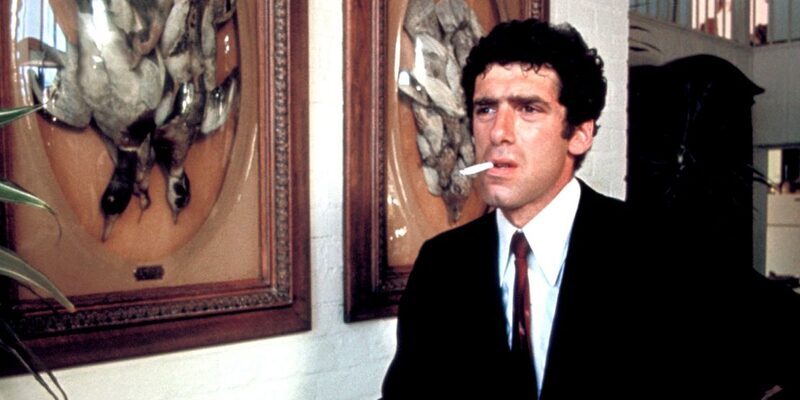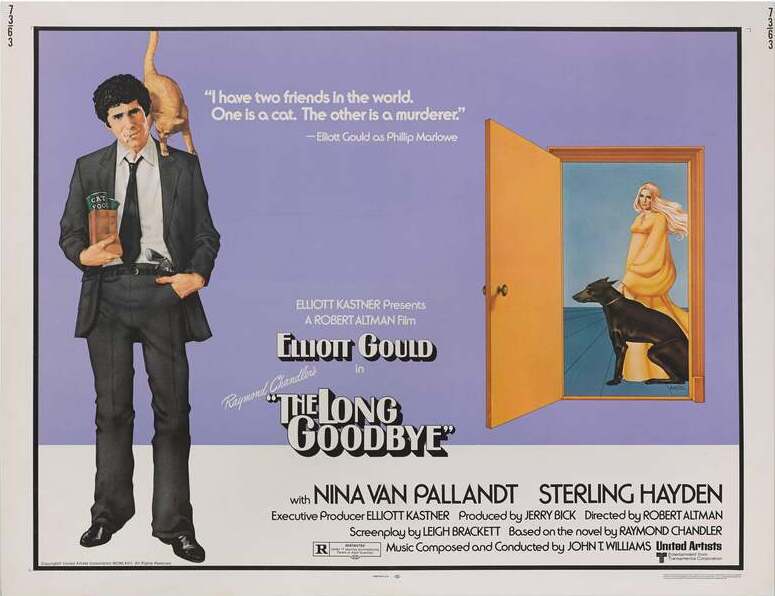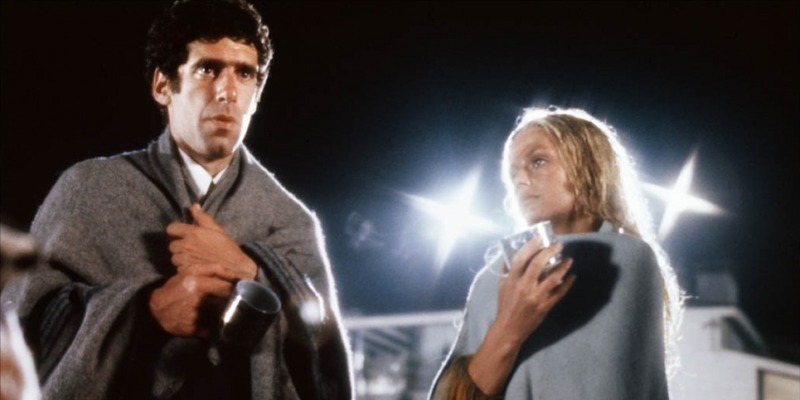
Robert Altman's revisionist detective flick.
Review by
Jason Abbey
Directed by: Robert
Altman
Starring: Elliott Gould, Nina van Pallandt, Sterling Hayden,
Mark Rydell, Henry Gibson, David Arkin, Arnold Schwarzenegger

Robert Altman's film version of Raymond Chandler's novel is a
strange hybrid of '40s noir gumshoe sleuthing transposed to '70s L.A., a
city of angels brimming with health food shops, the sweet smell of Mary Jane
in the air and naked hippies getting their yoga on. It's the era of pop
psychology and discovering yourself, a place where even your cat won't be
hassled by The Man. If you don't get the correct cat food, he is gone baby,
solid gone.
Altman has called this film "Rip Van Marlowe," intimating that the
detective went to sleep in the '40s and woke up 30 years later. He does
himself a disservice as this brings to mind a fish out of water comedy or a
farce like Play it Again Sam. The Long Goodbye is much more subtle than that, a mix of
classic old Hollywood story structure at the service of the visual panache
and daring modernism of the then thriving American independent scene. His
trump card is Elliott Gould as Phillip Marlowe, a mumbling, laconic,
shambolic presence. He manages to make him a man out of time, a man
constantly bemused and amused by his surroundings but also sharper and wiser
than he is making out to be. He may be a shirt and tie man in a tie dye
world, but he is also the only moral man in an amoral world.

Like all good detective stories, this involves money, greed, murder, lust
and a dame (Nina van Pallandt as Eileen Wade). But like that other
classic Chandler adaptation The Big Sleep (both these films
share the same writer, Leigh Brackett) the sleuthing element has been
put very much into the background. The Big Sleep plays film
noir as screwball comedy; The Long Goodbye takes the text
and moulds it to fit Altman's freewheeling approach, with his ever prowling
camera, bleached out visuals and love of character. It is part satire of
Hollywood and part study of the destructive power of the writing process (a
nod to Chandler's own demons).
That Altman manages to achieve this and still make a satisfying detective
story is what makes this a triumph. When Marlowe helps drive his friend
Terry Lennox (Jim Bouton) over the border into Mexico, little does he
realise he has left a dead ex and is carrying a bag full of mob money. When
Lennox is found dead, the violent Marty Augustine (Mark Rydell) puts
pressure on Marlowe to return the money or suffer a fate similar to Lennox.
In the meantime Marlowe is hired by Eileen, a resident of the same gated
community as Lennox to find her missing husband Roger Wade (Sterling Hayden), a dyspeptic author prone to vanishing for long periods.
The plot is sinuous and complex, but the marvelous economy of the writing
allows the story to unwind with fluidity, while creating complex and
intricate character work. It is muscular, stripped down writing but still
very much recognisably an Altman work. The overlapping dialogue and
seemingly carefree approach is still very much to the fore.
The Long Goodbye stands out now as one of his many classics,
easily on par with Short Cuts, California Split and McCabe & Mrs Miller. The time period may have been changed and the film takes liberties with
Chandler's novel, but you feel that both the author and fans of his resolute
detective would not feel shortchanged. This is a knowing film but it never
degenerates into pastiche.

Everyone is working at the top of their game. Gould is his usual brilliant
self; wry, offbeat and mercurial but never letting his Marlowe slip into
self parody. Hayden also does outstanding work as the Hemingway-like author,
bombastic and arrogant but also vulnerable and troubled by his demons.
Longtime Clint Eastwood associate Henry Gibson is also slimily
avuncular as Dr Verringer; he manages to keep a fine balance between making
you wonder if he is trying to heal Wade or just using him as a convenient
cash cow. Altman's disdain for the self help quack is evident. As Eileen,
Van Pallandt may look the part but her performance is the only weak link in
the movie. As the nexus from which the plot unravels, she is a bland,
insipid presence who seems unable to stir the grand passion the story
demands. Rydell's quixotic gangster is also a lot of fun, at parts comical
but with an edge of danger that threatens to turn into violence at any
moment (a stand out moment involving a bottle of cola is particularly wince
inducing).
The music by John Williams is also a delight. The Song 'The Long
Goodbye' is used throughout the film as a doorbell, supermarket music, by a
lounge singer and amusingly by a Mariachi band during a funeral. It is a
witty conceit that perfectly encapsulates the playful, wry tone of the
film.

Vilmos Zsigmond's cinematography is also a stand out. One of the
greats of '70s cinema, his bleached out aesthetic makes this a singularly
breezy noir; you can feel the sweat and heat as the pressure builds.
Add to the mix uncredited performances by David Carradine and
Arnold Schwarzenegger (his ever moving pectorals doing most of the
acting work in this mute cameo); one of the best endings in modern cinema,
in which Marlowe's rigid sense of moral justice comes to the fore; and the
best acting performance by a cat outside of a Disney movie. This is a
classic piece of film-making. Without this film there is no Big Lebowski. In a word, essential.

